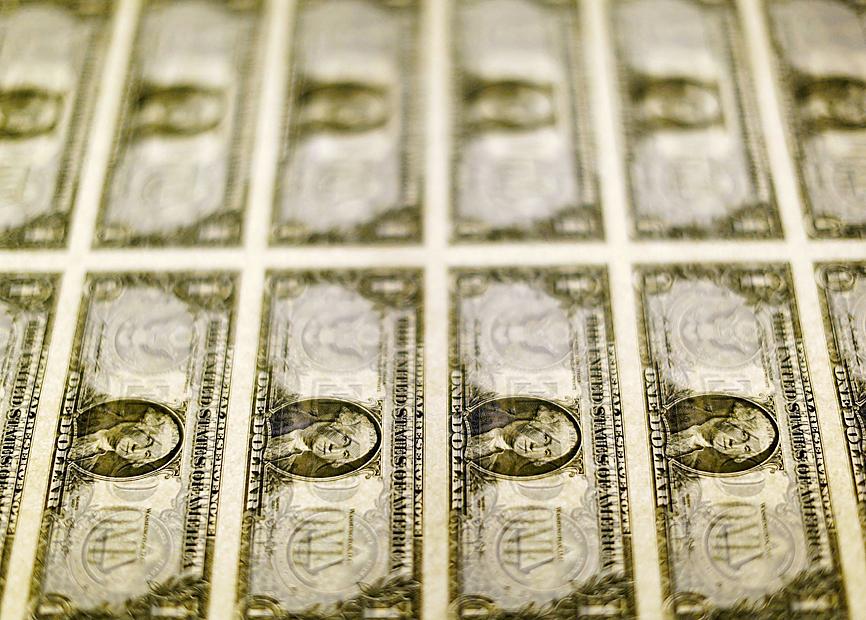The US dollar’s relentless rise is threatening to trigger more outflows from Asia’s emerging-market shares, spoiling hopes of the region making a comeback in the second half of this year.
A gauge of Asian currencies has slumped to its lowest in more than two years, an ominous sign for equities given their strong relationship with moves in foreign exchange.
The MSCI Asia ex-Japan Index has fallen 20 percent as foreign investors took US$71 billion out of emerging Asian stock markets outside China so far this year, already double last year’s outflows.

Photo: Reuters
The US dollar has steamrolled through global currency markets, benefiting from bets on aggressive US Federal Reserve rate hikes. A stronger greenback bodes ill for Asian stocks when it signals lower risk appetite and is seen as negative for growth in emerging economies, many of which rely on imports priced in the currency.
Tech-heavy Asian markets such as South Korea and Taiwan look particularly vulnerable as higher global bond yields and recessionary headwinds are hurting valuations and the demand outlook.
Stock benchmarks in the two nations are among the worst performers in the region this year, and foreigners have net sold a combined US$50 billion of their shares.
For less export-reliant markets, weaker local currencies worsen national balance sheets and company profit margins, as corporate and sovereign borrowers suffer from higher repayments on dollar-denominated debt.
In India, one of the world’s biggest oil importers, the rupee has tumbled to a record low as the nation faces widening current-account and fiscal deficits.
Meanwhile, the hands-off approach by Thailand’s monetary authority has resulted in a slump in the baht, one of the big decliners in emerging-market currencies this year. Further currency weakness could threaten the resilience their stock markets have shown this year.
Chinese stocks, which experienced a slew of bullish calls last month, have taken a sharp turn lower this month, adding to Asia’s woes. A key gauge of shares listed in Hong Kong is down more than 9 percent amid renewed COVID-19 concerns, an intensifying property crisis and fresh regulatory scrutiny of the tech sector.
Sometimes it doesn’t take much for a trickle in foreign outflows to turn into a flood, said Siddharth Singhai, chief investment officer at New York-based hedge fund Ironhold Capital.
“Foreign investors are very fickle. They tend to move in and out very quickly,” he said.
Asia’s infrastructure, home building and construction stocks will be more affected by a stronger US dollar given their sensitivity to interest rates, he added.
For those seeking to pick up some beaten-down shares, Taiwanese telecoms and consumer staple stocks, Indian IT firms, South Korean healthcare names and Malaysian energy stocks were consistent outperformers during similar periods of depreciating Asian currencies in the past decade, a study by BNP Paribas Securities analysts last year showed.
“From a flows and sentiment perspective, yes Asian stocks tend to underperform in the short term against a rising dollar,” said Christina Woon, investment director for Asia equities at Abrdn PLC.
“You can also find a number of beneficiaries, such as exporters, or companies that have more domestically focused tailwinds where a stronger dollar is less of an issue,” she added.

Vincent Wei led fellow Singaporean farmers around an empty Malaysian plot, laying out plans for a greenhouse and rows of leafy vegetables. What he pitched was not just space for crops, but a lifeline for growers struggling to make ends meet in a city-state with high prices and little vacant land. The future agriculture hub is part of a joint special economic zone launched last year by the two neighbors, expected to cost US$123 million and produce 10,000 tonnes of fresh produce annually. It is attracting Singaporean farmers with promises of cheaper land, labor and energy just over the border.

US actor Matthew McConaughey has filed recordings of his image and voice with US patent authorities to protect them from unauthorized usage by artificial intelligence (AI) platforms, a representative said earlier this week. Several video clips and audio recordings were registered by the commercial arm of the Just Keep Livin’ Foundation, a non-profit created by the Oscar-winning actor and his wife, Camila, according to the US Patent and Trademark Office database. Many artists are increasingly concerned about the uncontrolled use of their image via generative AI since the rollout of ChatGPT and other AI-powered tools. Several US states have adopted

KEEPING UP: The acquisition of a cleanroom in Taiwan would enable Micron to increase production in a market where demand continues to outpace supply, a Micron official said Micron Technology Inc has signed a letter of intent to buy a fabrication site in Taiwan from Powerchip Semiconductor Manufacturing Corp (力積電) for US$1.8 billion to expand its production of memory chips. Micron would take control of the P5 site in Miaoli County’s Tongluo Township (銅鑼) and plans to ramp up DRAM production in phases after the transaction closes in the second quarter, the company said in a statement on Saturday. The acquisition includes an existing 12 inch fab cleanroom of 27,871m2 and would further position Micron to address growing global demand for memory solutions, the company said. Micron expects the transaction to

A proposed billionaires’ tax in California has ignited a political uproar in Silicon Valley, with tech titans threatening to leave the state while California Governor Gavin Newsom of the Democratic Party maneuvers to defeat a levy that he fears would lead to an exodus of wealth. A technology mecca, California has more billionaires than any other US state — a few hundred, by some estimates. About half its personal income tax revenue, a financial backbone in the nearly US$350 billion budget, comes from the top 1 percent of earners. A large healthcare union is attempting to place a proposal before